
In for-profit work, management has as its primary function the satisfaction of a range of stakeholders.
This typically involves making a profit (for the shareholders), creating valued products at a reasonable cost (for customers), and providing rewarding employment opportunities (for employees).
From the days of the Licence Raj to the 21st Century, Indian business scene has seen colossal changes.
Here is a list of people who in their unique way changed how India conducts business today. Some of them may not be a typical 'management guru', but without their acumen their companies would not be what they are today.
. . .
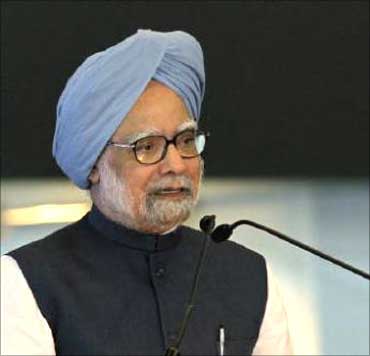
Manmohan Singh
"My top most priority is to deal with India's massive social and economic problems, so that chronic poverty, ignorance and disease can be conquered in a reasonably short period of time."
He is the man behind India's economic reforms. In 1971, Singh joined the government as an economic advisor to the ministry of foreign trade.
The big moment came in 1991, when the then prime minister P V Narasimha Rao came into power. The country was faced with a severe economic crisis and external bankruptcy.
Humble and self-deprecating to the core, Singh is known to underplay the achievements of his illustrious career.
Born to Gurmukh Singh and Gursharan Kaur at a place called Gah (now in Pakistan) in Punjab on September 26, 1932, Singh suffered the Partition, being temporarily separated from his family in the mayhem of the times.
He won the Euromoney finance minister of the year award in 1993 and the Asiamoney finance minister of the year award twice, in 1993 and 1994. He became the undisputed father of economic reforms in India.
Singh started the process of simplification and rationalisation of the tax system. Many controls and regulation on the industry were removed, which meant the death of the Permit Raj and a free rein to entrepreneurs.
Looking back, Singh says that when he stood up in Parliament stating the case for reforms his argument was that in the midst of an unprecedented crisis, it was time to think big rather than 'tighten the belt.'
He holds an M.A., D.Phil. (Oxford), D.Litt.(Honoris Causa); I.N.C.(Assam).
If he comes back as the finance minister, Singh faces a very different economy from what he inherited about 10 years ago.
. . .
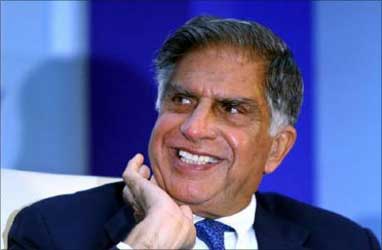
Ratan Naval Tata
"I am proud of my country. But we need to unite to make a unified India, free of communalism and casteism. We need to build India into a land of equal opportunity for all. We can be a truly great nation if we set our sights high and deliver to the people the fruits of continued growth, prosperity and equal opportunity."
Ratan Tata is ranked 12th among the world's 50 best business thinkers. Chairman of Tata Sons, the holding company of the Tata Group has steered the company with diversified interests to scale new peaks.
After graduating in architecture from Cornell University in 1962, Tata had a short stint with Jones and Emmons in Los Angeles, California, before returning to India in late 1962.
Ratan Tata joined the Tata group and was appointed chairman of Tata Industries in 1981.
In 1991, Ratan Tata took over the Chairmanship from JRD Tata. Under his leadership, Tata Consultancy Services went public and Tata Motors was listed in the New York Stock Exchange.
Tata was the brain behind Tata Motors' first indigenously built car, the Indica. The world's cheapest car, the Tata Nano is also his dream project. During his tenure, the group's revenues have grown nearly 13-fold.
He was recently ranked the most trusted name among businessmen in India in a list compiled by Reader's Digest.
Ratan Tata was awarded the Padma Bhushan in 2000.
. . .
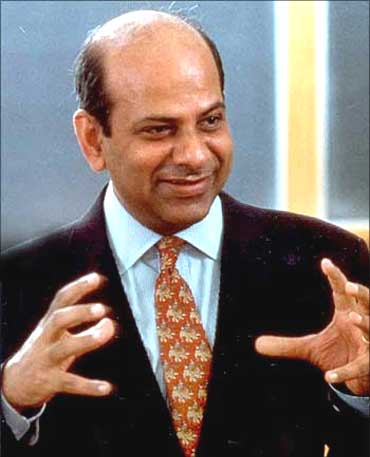
Vijay Govindarajan
"Globalisation means that multinationals target only the top of the pyramid in these markets, the wealthiest 10%. But the real potential lies in unlocking the other 90 per cent."
Vijay Govindarajan is one of the world's leading experts on strategy and innovation. Govindarajan says the biggest opportunities for multinationals in next 25 years will be customers moving from poor countries.
He is the Professor of International Business and the Founding Director of the Center for Global Leadership at the Tuck School of Business at Dartmouth College.
He is also the chief innovation consultant for General Electric.
Govindarajan has ranked among the top five most respected 'executive coach on strategy' by Forbes. He has also been rated as an outstanding faculty member by Business Week.
Govindarajan has been a member of the faculty at the Harvard Business School and the Indian Institute of Management Ahmedabad.
...
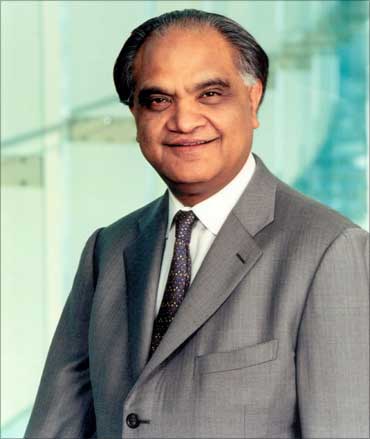
Ram Charan
"Real leaders, I have found, exhibit an enthusiasm for selecting people who are better than they are."
Ram Charan is one of the world's most popular business advisors. Known for his ability to solve the toughest business problems, he has worked with some of the most successful companies, including GE, Verizon, Novartis, Dupont, Thomson Corporation, Honeywell etc over the last three decades.
Born in 1939 in Uttar Pradesh, Charan participated actively in the family's shoe business.
With an engineering degree, he left India to take up a job in Australia and then in Hawaii. He later did his MBA and doctorate degrees from Harvard Business School, where he graduated with high distinction.
After receiving his doctorate degree, he started teaching at the Harvard Business School faculty.
Charan is known for offering timely and relevant advice to solve complex business problems. He is the author of multiple books, including his latest publication, Owning Up: The 14 Questions Every Board Member Needs to Ask.
He served on the Blue Ribbon Commission on corporate governance and was selected as a Distinguished Fellow of the National Academy of Human Resources. He sits on the boards of Austin Industries and Tyco Electronics.
Charan runs his business management consulting company under the name Charan Associates located in Dallas.
. . .
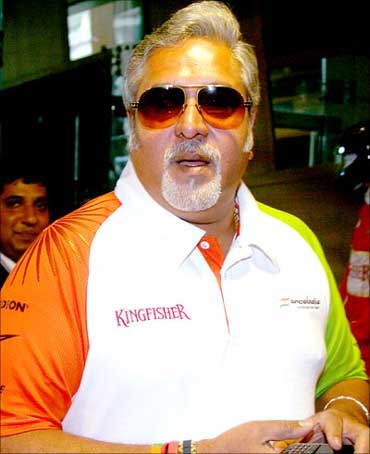
Vijay Mallya
"I think that the poorest of the poor... look up to wealthy and successful Indians with some degree of respect and pride."
Vijay Mallya took over as chairman of United Breweries Group in 1984. Since then, the group has grown into a multi-national conglomerate of over sixty companies.
In 2005, Mallya established Kingfisher Airlines. Kingfisher Airlines obtained a 26% stake in Air Deccan, a low cost Indian airline which Mallya later acquired fully and rebranded as Kingfisher Red.
In 2007, Mallya and the Mol family from The Netherlands bought the Spyker F1 team for euro 88 million euros. The team changed its name to Force India F1 from the 2008 Season.
Mallya's United Breweries sponsors the East Bengal and Mohun Bagan football clubs in Kolkata.
Mallya's flagship firm UB Group owns the Royal Challengers Bangalore team in the Indian Premier League.
He is noted for his successful bidding in auctions. He brought back the sword of Tipu Sultan to India and bought the belongings of Mahatma Gandhi in a New York auction.
He established Mallya Hospital in Bengaluru, and helped to fund the Mallya Aditi International School, a private school in the city.
. . .
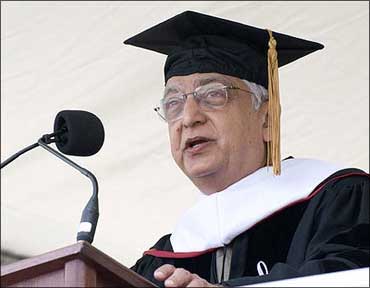
Azim Hashim Premji
"As you get bigger, you have to learn to delegate. It's also an excellent way to get staff involved in the company's operations."
When Azim Premji occupied the hot seat, after his father's untimely death, Wipro dealt in hydrogenated cooking fats.
When Premji made a focused shift from soaps to software, the Amalner-based vanaspati manufacturing company, the Western India Vegetable Product became Wipro Products Ltd, Wipro Technologies and Wipro Corporation.
Later the company's IT division became the world's first to win SEI CMM level 5 and PCMM Level 5 (People Capability Maturity Model) certification, the latest in quality standards.
Premji has been recognised by Business Week as one of the Greatest Entrepreneurs.
As on March 9, 2010, he was one of the wealthiest people in India, with a net worth of $17 billion.
In 2009, he was awarded an honorary doctorate from Wesleyan University in Middletown, Connecticut for his outstanding philanthropic work. The Azim Premji Foundation was set up with financial resources contributed by the man himself.
In 2000, he was voted among the 20 most powerful men in the world by Asiaweek. He was also among the 50 richest people in the world from 2001 to 2003 according to Forbes. In April 2004, he was rated among the 100 most influential people in the world by the Time magazine.
Premji is also often known as the Indian Bill Gates.
. . .
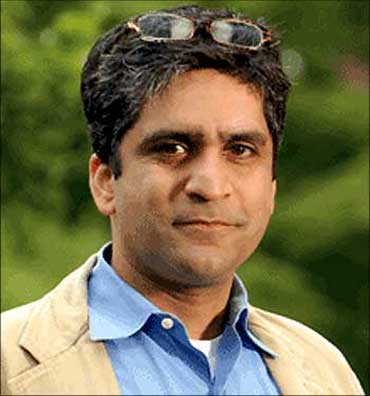
Rakesh Khurana
"Even if you have a (person) with the same sorts of qualities of Steve Jobs, the company is never going to be as animated or as authentic as it was when you had the founder running it."
Rakesh Khurana is an associate professor of organizational behaviour at Harvard Business School.
He worked for three years as a founding team member of Cambridge Technology Partners before starting graduate school in 1994.
He started teaching at MIT's Sloan School of Management. In 2000, he joined the Harvard Business School.
His research focuses on managerial labour markets. He is best known for his book, Searching for a Corporate Saviour: The Irrational Quest for Charismatic CEOs and several managerial articles.
. . .
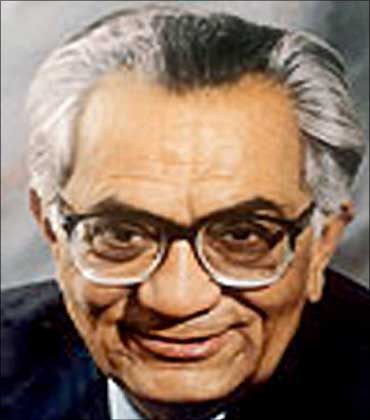
Promod Batra
"Your mind is a Thoughts Factory and you are the production manager. It can produce either positive or negative thoughts. The ideas of others are your raw materials."
Happiness, wealth, fame, fun, success, stress reduction, writing more books, travelling - you name it- are all by-products of goal-setting, says Promod Batra. Batra along with his son Vijay Batra have published several motivational books.
Promod Batra did his MBA from University of Minnesota, USA. He worked with Escorts for over three decades.
His workshops across different companies in India have been very popular.
He has written several books on management, enhancing selling skills, simple solutions to retain customers, pearls of wisdom for the family and even on ways to live peacefully with in-laws!
. . .
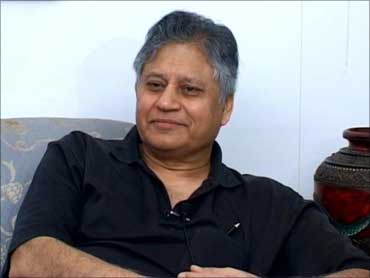
Shiv Khera
"If we are not a part of the solution, then we are the problem."
Shiv Khera's story is truly inspirational. Three decades ago, he used to wash cars and sell insurance policies in the United States. Today, he has a multi-million dollar empire.
Shiv Khera is the founder of Qualified Learning Systems Inc.
He has established himself as an educator, business consultant and a successful entrepreneur. He motivates and encourages people to explore their true potential and succeed in whatever they do.
He has been recognised as a 'Louis Marchesi Fellow' by the Round Table Foundation.
Shiv Khera's client list includes, among others, Lufthansa, Johnson & Johnson, Motorola, Nestle, GSK, Tetrapak, Phillips, Gillette, HSBC, Carrier, IBM, Ericsson and GM.
He has authored 12 books including the bestseller, You Can Win.
. . .
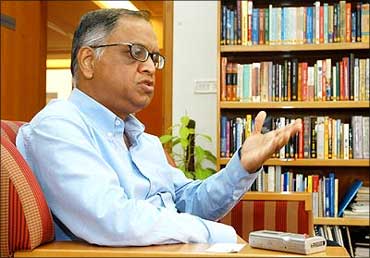
N R Narayana Murthy
"There is only one ingredient for innovation and that is the power of the human mind. As long as a company is able to attract, enable, empower and retain the best of the brightest, it will have a play."
N R Narayana Murthy is a name synonymous with the Indian IT industry. He founded Infosys in 1981.
Under his leadership, Infosys has grown to be a global company. It was listed on the Nasdaq in 1999. He has led key corporate governance initiatives in India. He is also an IT advisor to several Asian countries.
He serves on the boards of Unilever, HSBC, Ford Foundation and the UN Foundation.
He also serves on the boards of Cornell University, Wharton School, Singapore Management University, Indian School of Business, Hyderabad, Indian institute of Management Technology, Bangalore and INSEAD.
The Economist ranked Narayana Murthy among the ten most-admired global business leaders in 2005. He has been awarded the Padma Vibhushan, the Legion d'honneur by the government of France, and the CBE by the British government. In 2009, his lectures delivered were published as a book titled, 'A Better India: A Better World.'
S 'Kris' Gopalakrishnan who co-founded Infosys Technologies Ltd. and has been its chief executive officer and managing director since June 22, 2007 was ranked 15th in the list of world's 50 best business thinkers in 2009.
. . .
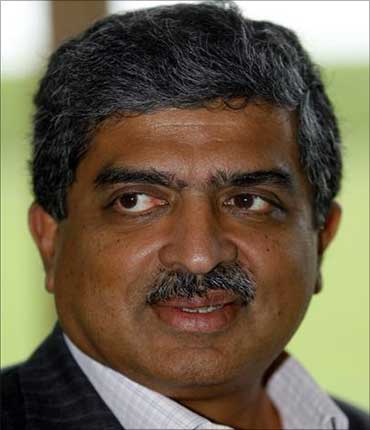
Nandan Nilekani
"Talent acquisition, transformation and management are critical anchors for the growth of the industry."
One of the youngest entrepreneurs to join 20 global leaders on the prestigious World Economic Forum Foundation Board in January 2006, is one of the co-founders of Infosys Technologies.
Nilekani became the chief executive officer of Infosys in March 2002, taking over from N R Narayana Murthy.
He left Infosys on July 9, 2009 to serve as the chairperson of the Unique Identification Authority of India.
He is also heading government of India's technology committee called TAGUP.
Nandan Nilekani was born in Bangalore (now Bengaluru), Karnataka, and is the younger son of Durga and Mohan Rao Nilekani.
He co-founded India's National Association of Software and Service Companies as well as the Bangalore Chapter of The IndUS Entrepreneurs.
In 2009, Time magazine placed Nilekani in the Time 100 list of 'World's Most Influential People'.
He was presented the 'Legend in Leadership Award' by the Yale University in November 2009. He is the first Indian to receive the top honour.
In his book, Imagining India: The Idea of a Renewed Nation Nilekani discusses topics such as the future of India, its young population, information technology, labour reform, and infrastructure, among others.
. . .
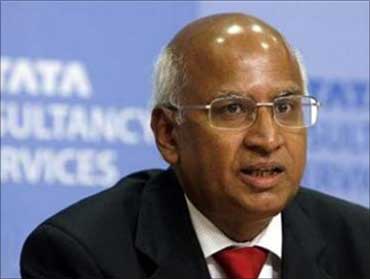
Subramanian Ramadorai
"In order to differentiate, the next wave is going to be about how much of innovation there is in the output -- in R&D, tools, processes, methodology and business models."
Beginning his career with TCS as a junior engineer, he rose through the ranks and eventually was charged with setting up TCS' operations in the United States in 1979 in New York City.
He has played a pioneering role in establishing Offshore Development Centers in India.
Ramadorai spearheaded TCS' quality initiatives, taking sixteen of its Development Centers to SEI's CMM Level 5, the highest and most prestigious performance assessment issued by the Software Engineering Institute.
In 2006, he was awarded the Padma Bhushan, India's third highest civilian honour.
He has also been honoured with the 'Management Man of the Year' award by the Bombay Management Association.
In June 2002, Consulting Magazine (USA) named him as being among the Top 25 Most Influential Consultants in the world, the only Indian CEO on the list.
On April 28, 2009, Ramadorai was awarded the Commander of the Order of the British Empire.
Ramadorai is the chairman of Tata Elxsi and vice-chairman of Tata Consultancy Services Ltd. His tenure as CEO and Managing Director of TCS ended on October 5, 2009.
. . .
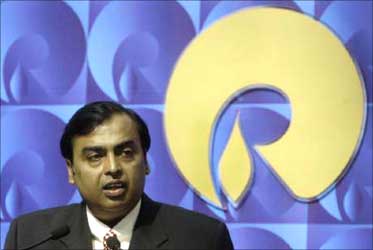
Mukesh Dhirubhai Ambani
"The organisational architecture is really that a centipede walks on hundred legs and one or two don't count. So if I lose one or two legs, the process will go on, the organization will go on, the growth will go on."
As of July 2010, Ambani is the richest man in Asia and the fourth richest in the world with a personal wealth of $29.0 billion.
He initiated Reliance's backward integration journey from textiles into polyester fibres and further into petrochemicals, petroleum refining and going up-stream into oil and gas exploration and production.
Ambani directed and led the creation of the world's largest grassroots petroleum refinery at Jamnagar.
. . .
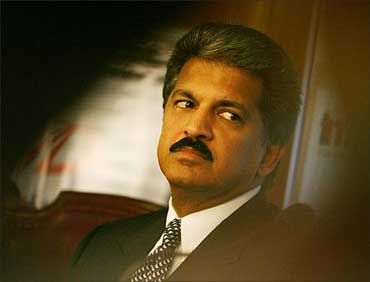
Anand Mahindra
"I did some research and identified four characteristics that successful companies share. One, they aspire to be leaders in their businesses. Two, they have global potential. Three, they are innovative. Four, they display a ruthless focus on financial returns."
As vice chairman and managing director of Mahindra & Mahindra, the flagship company of the $6.3 billion Mahindra Group, Anand G Mahindra has played a vital role in making the company one of India's top 10 corporates.
After doing his MBA from the Harvard Business School, Boston, he returned to India and joined Mahindra Ugine Steel Company. In 1989 he was appointed president and deputy managing director of the company.
During his stint at Musco, he initiated the Mahindra Group's diversification into the new business areas of real estate development and hospitality management.
He became the deputy managing director of Mahindra & Mahindra in 1991. He later became the managing director of Mahindra & Mahindra Ltd in April 1997.
Passionate about education, he is a board member in a number of educational institutes. He also writes on the Indian economy in some of India's leading business magazines.
. . .
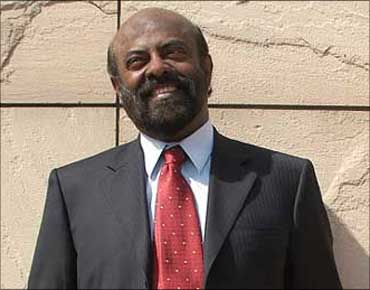
Shiv Nadar
"For 18 years when I was CEO of HCL Infosystems, I was hands on. I could have taken my hands off the steering wheel a lot earlier and delegated more authority than I did. I did delegate authority, but I could have done more."
One of India's most enterprising businessmen, Shiv Nadar started a company called Microcomp to sell teledigital calculators in the Indian market under the brand name 'Televista'.
HCL was founded later in 1976 with an investment of Rs 187,000. Over the next 3 decades, Nadar turned the IT hardware company into one of India's biggest IT enterprises.
Shiv Nadar has also founded SSN College of Engineering in Chennai.
The government rewarded him with Padma Bhushan for his achievements in IT industry.
. . .
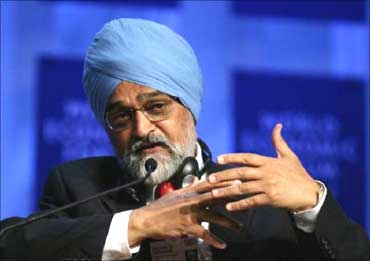
Montek Singh Ahluwalia
"There is no doubt that the rise of protectionism will create problems for all members of the world economy, including us, and we often make the point that at least as developing countries there is a lot of doubt and suspicion about the fairness of the global economic system."
One of India's key economic policy makers, Montek Singh Ahluwalia is the Deputy Chairman of the Planning Commission.
He became the first Director of the Independent Evaluation Office, International Monetary Fund (IMF) on July 9, 2001.
He has also served as Member of the Economic Advisory Council to the Prime Minister.
He has also worked as Finance Secretary, Secretary, Department of Economic Affairs; Commerce Secretary and Special Secretary to the Prime Minister.
. . .

K V Kamath
"In any organisational change, you give people a golden handshake but there will still be people working in areas from which you want to push them on or out. So you park them in other spots, you remove the blockage, and get the flow going the way you want it."
One of India's outstanding business leaders, K V Kamath is currently the non-executive chairman of ICICI Bank.
Kamath served as ICICI Bank's managing director and CEO from May 1, 1996 until his retirement from executive responsibilities on April 30, 2009.
After graduating from IIM-A in 1971, Kamath started his career with ICICI (Industrial Credit and Investment Corporation of India. In 1988, he joined the Asian Development Bank and spent several years in south-east Asia before returning to ICICI as its managing director & CEO in 1996.
He became managing director & CEO of ICICI Bank in 2002 following the merger of ICICI with ICICI Bank.
Under his leadership, the ICICI Group transformed into a diversified, technology-driven financial services group.
He was awarded the Padma Bhushan in May 2008.
. . .
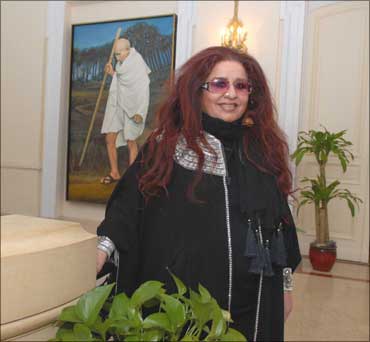
Shahnaz Husain
"You give the world an idea and the future of the world changes just as an idea. The best advertisement is when the public says it's good."
Shahnaz Husain, India's undisputed queen of herbal beauty products, is one of the most prominent personalities of the Indian corporate world.
The 64-year-old Husain, whose employees address her as 'Princess', is a Padma Shri winner. She proudly says that she is the only such Padma awardee to be given the award for her pioneering and trailblazing herbal beauty products business, the Shahnaz Husain Group.
Her conglomerate is listed in the Guinness Book of Records as the largest such organisation of its kind in the world with its global chain of franchise salons, shops, beauty training institutes and spas.
Husain has studied cosmetology and Ayurveda, and feels that herbal cosmetics are the best alternative to chemical ones. Her beauty products are skin friendly and have made their presence felt in global markets -- from Asia to the United States.
Her company has during this time performed excellently, showing tremendous growth. A self-made businesswoman, Shahnaz Husain has moulded traditional knowledge into a multi-million-dollar business empire.
. . .
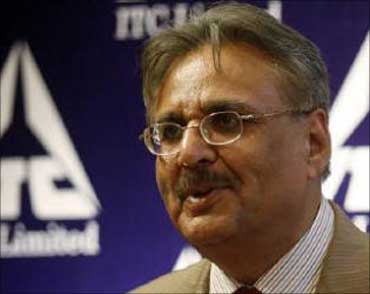
Yogesh Chander Deveshwar
"In the consumer business, you need scale to build a franchise. It is a chicken-and-egg problem. We will infuse life into these businesses so that they can stand on their own legs."
In 1994 Deveshwar rejoined ITC and was appointed whole time director and vice chairman of the company. He took over as chairman of ITC in January 1996.
Deveshwar inherited a slew of disputes from his predecessors when he assumed the mantle at ITC.
The company's investments in the creation of a unique information-technology-enabled rural information and trading network, called e-choupal, and India's first rural mall at Sehore, have transformed ITC from a multinational peddling cigarettes to a venture with firm roots and commitment in the Indian economy.
As far as ITC's paper business is concerned, Deveshwar looked beyond the balance sheet through investments in social forestry programmes and environment-friendly technology.
Through ITC's retailing and food businesses Deveshwar brought Indian products to the market without a hitch.
He received the Marketing Man of the Year Award in 1994.
Deveshwar is the Past President of the Confederation of Indian Industry. He is also a member of the Board of Governors of the Indian School of Business and a former Chairman of the Society and Board of Governors of the Indian Institute of Management, Calcutta.
. . .
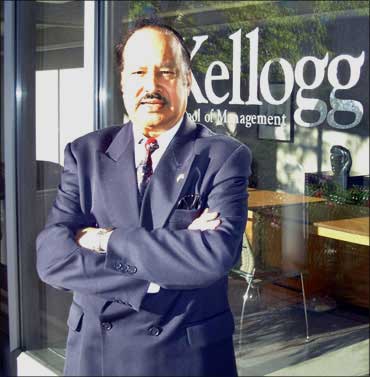
Bala Balachandran
"Yesterday is our Experience, Today is our Experiment and Tomorrow is our Expectations."
Bala Balachandran is one of the top management gurus of Indian origin in the United States.
Two decades ago, Balachandran was the only Indian professor at the prestigious Kellogg Graduate School of Management in Chicago, where he has specialized in accounting information systems and decision sciences.
He has been with Kellogg School for the past 34 years. He has played a key role in building the Indian School of Business, Hyderabad.
He has also set up his own B-school, the Great Lakes Institute of Management, in Chennai. Earlier he worked as a advisor in the planning commission.
He is on the board of directors of the Credit Rating Information Services of India (CRISIL). He is working on projects to integrate information technology in states like Gujarat, Maharashtra, Punjab and Rajasthan.
He is also a consultant to the governments of Israel, Malaysia and Peru.
Click NEXT to take the poll . . .